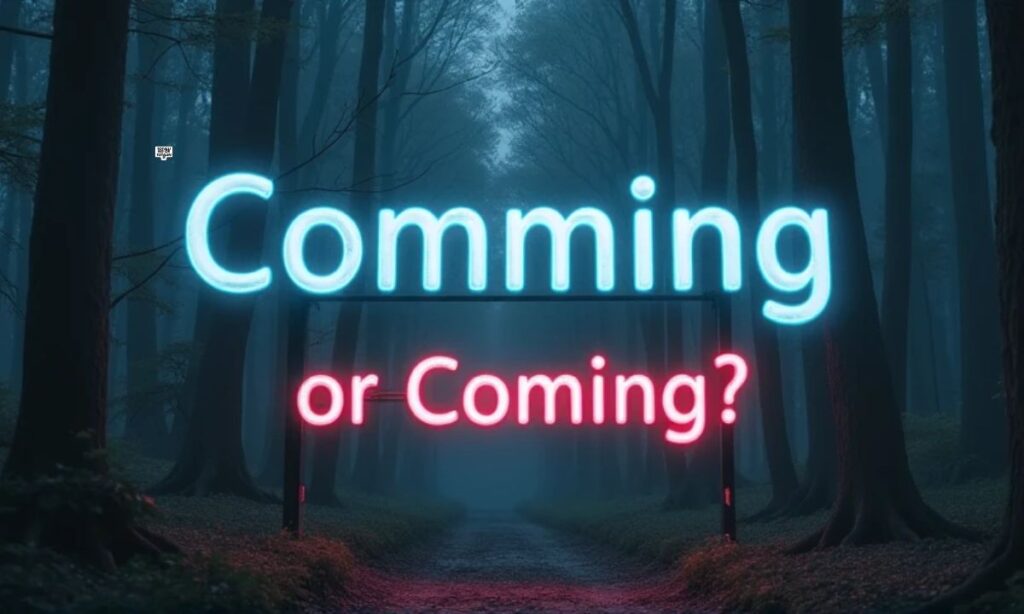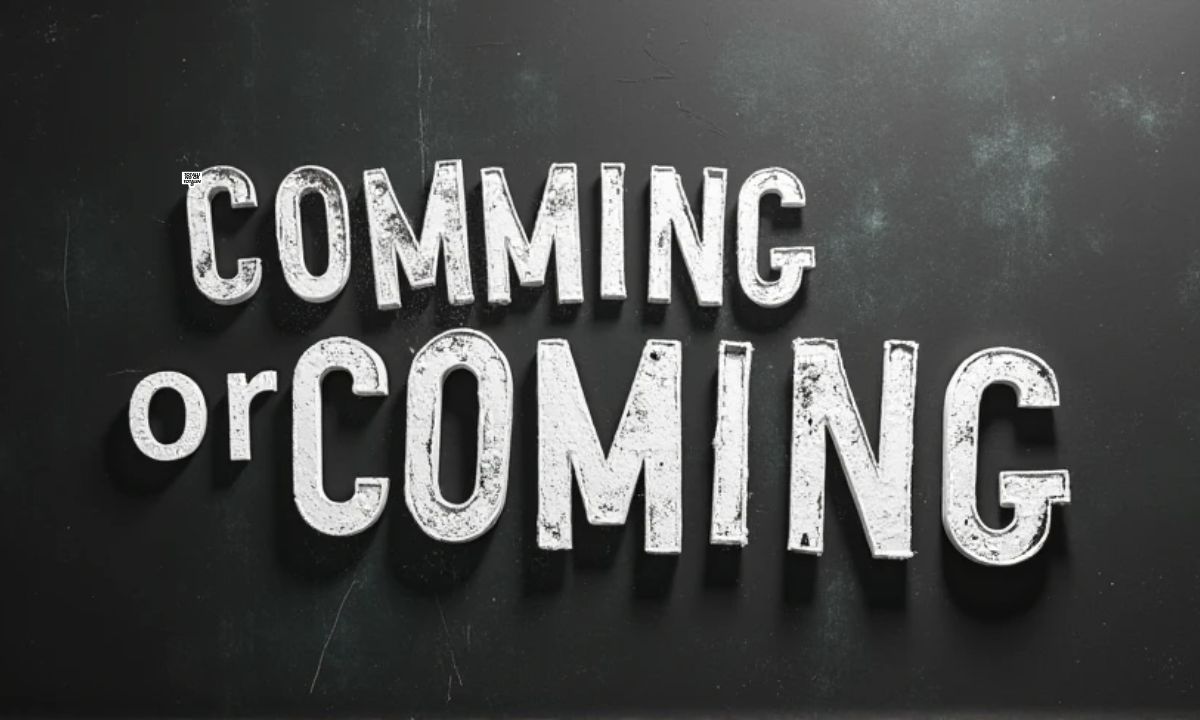Have you ever found yourself hesitating over whether to type “coming” or “comming”? You’re not alone. This common spelling confusion trips up writers of all skill levels, but today we’ll put this question to rest once and for all.
Let’s dive into the proper spelling rules and arm you with foolproof strategies to enhance your writing accuracy.
Understanding the Difference: “Comming” vs. “Coming”
The distinction is crystal clear: “Coming” is the only correct spelling. “Comming” represents a common spelling mistake that stems from misunderstanding basic English spelling rules. The word “come” follows specific patterns in the English language that determine how we form its present participle.
Here’s a simple breakdown:
- Come (base form)
- Coming (present participle)
- Came (past tense)
- Come (past participle)
Why “Comming” Is Incorrect
The error in writing “comming” stems from confusion about doubling consonants rules. In English, we typically double the final consonant before adding -ing when a single-syllable word ends in consonant-vowel-consonant (CVC) pattern. However, “come” ends with a silent ‘e’, which follows different rules entirely.
Examples of correct consonant doubling:
- Run → Running
- Sit → Sitting
- Hop → Hopping
Scenario Example: The Incorrect Use of “Comming”

❌ Incorrect: “I am comming to the meeting at 2 PM.” ❌ Incorrect: “They’re comming over for dinner tonight.” ❌ Incorrect: “Spring is comming early this year.”
The Correct Use: “Coming”
When adding -ing to words ending in silent ‘e’, we simply drop the ‘e’ and add -ing. This fundamental spelling rule applies to numerous English words and helps maintain proper spelling standards.
Examples of correct silent ‘e’ dropping:
- Come → Coming
- Write → Writing
- Make → Making
- Take → Taking
Scenario Example: The Correct Use of “Coming”
✅ Correct: “I’m coming to the conference next week.” ✅ Correct: “The upcoming meeting will discuss budget plans.” ✅ Correct: “Spring is coming early this year.”
Why Do We Make This Mistake?
Understanding common spelling errors helps us avoid them. The confusion often arises from:
- Misapplying consonant doubling rules
- Influence from similar-sounding words
- Regional pronunciation differences
- Autocorrect dependencies
The Silent “E” Rule
The silent ‘e’ rule is crucial for proper spelling. Here’s a comprehensive table showing how it works:
| Base Word | Remove ‘e’ | Add -ing | Result |
| come | com | ing | coming |
| write | writ | ing | writing |
| smile | smil | ing | smiling |
| dance | danc | ing | dancing |
Common Spelling Errors and How to Avoid Them
Beyond the “coming” vs “comming” confusion, English brims with tricky word pairs that challenge writers. Words like “occurred/occured”, “beginning/begining”, and “referred/refered” follow similar patterns.
The key lies in understanding basic spelling rules rather than memorizing each word. Start by learning root words and their patterns.
Professional writing standards demand attention to frequently confused words. Here are some commonly confused pairs:
- Coming vs. Comming
- Writing vs. Writting
- Making vs. Makking
- Taking vs. Takking
How Writing Tools Can Help
Modern writing tools serve as your first line of defense against spelling errors. Grammarly and ProWritingAid don’t just catch mistakes – they explain the rules behind them.
These tools offer real-time suggestions, track your common errors, and help you develop better writing habits. But remember, they’re aids, not replacements for learning proper spelling.
Modern writing tools like Grammarly and ProWritingAid offer invaluable assistance:
- Real-time error detection
- Contextual suggestions
- Grammar pattern recognition
- Style improvements
Examples of “Coming” in Different Contexts
“Coming” fits naturally in various situations: “I’m coming to the meeting” in business contexts, “Spring is coming” in creative writing, or “The project is coming along nicely” in progress updates. Each usage follows the same spelling rule while serving different communication needs.
In a Business Email:
“I’m coming to the quarterly review meeting on Thursday. Please find the attached reports for discussion.”
In a Motivational Speech:
“Success isn’t about where you’re coming from, but where you’re going.”
The Role of Proper Spelling in Effective Writing
Clear writing opens doors. Poor spelling can derail your message and diminish your credibility. In business emails, job applications, or social media posts, proper spelling shows attention to detail and professionalism. Think of it as your personal brand’s quality control.
Research shows that spelling errors can significantly impact professional credibility:
- 75% of employers report that they’re less likely to hire candidates with frequent spelling errors
- 59% of website users avoid businesses with poor spelling
- 85% of business correspondence requires proper spelling standards
Why Spelling Errors Matter in Professional Settings

Professional credibility hinges on attention to detail, and proper spelling plays a crucial role. Even a single error like writing “comming” instead of “coming” can impact your professional image. Here’s what research tells us about spelling in the workplace:
- 82% of HR managers reject resumes with spelling errors
- 93% of business leaders say writing skills are essential for career advancement
- 65% of online readers trust content more when it’s error-free
Real-world Impact Examples:
- Lost business opportunities
- Reduced email response rates
- Lower customer trust ratings
- Missed promotion opportunities
Avoiding the “Comming” Trap: Tips for Writers
Create your own memory tricks. When you write “come,” picture dropping the ‘e’ before adding ‘ing’. Read extensively to reinforce correct patterns. Set up custom autocorrect rules in your writing software. Most importantly, take time to proofread your work.
Let’s explore proven strategies to maintain error-free writing:
- Learn Pattern Recognition
- Identify word families
- Practice similar examples
- Create memory hooks
- Use Reliable Reference Tools
- Professional style guides
- Online dictionaries
- Grammar checking software
- Develop Proofreading Habits
- Read backwards
- Take timed breaks
- Use text-to-speech
The Importance of Learning Proper Spelling

Strong spelling skills boost your confidence in writing. They help you communicate more effectively and maintain professional relationships. In our digital age, where written communication dominates, proper spelling remains a vital skill that sets you apart.
Mastering correct spelling offers lasting benefits:
- Professional Advantages
- Enhanced workplace communication
- Increased credibility
- Better document quality
- Personal Growth
- Improved reading comprehension
- Stronger vocabulary
- Better writing confidence
- Digital Communication
- More effective emails
- Better social media presence
- Clearer instant messaging
Wrapping It Up
Mastering English spelling rules doesn’t happen overnight, but understanding why “coming” is correct while “comming” is wrong provides a solid foundation for improving your writing. Remember these key points:
- Drop the silent ‘e’ before adding -ing
- Use writing tools for additional support
- Practice with similar word patterns
- Proofread carefully
Pro Tip: Create a personal checklist of commonly confused words and review it regularly while writing.
Frequently Asked Questions
Q: Why do we drop the ‘e’ in “coming”?
A: The silent ‘e’ is dropped when adding suffixes beginning with vowels to maintain proper pronunciation and spelling patterns.
Q: Are there exceptions to this rule?
A: Yes, words ending in ‘ee’ (like “see” → “seeing”) or when the ‘e’ affects pronunciation (like “age” → “ageing/aging”).
Q: How can I remember the correct spelling?
A: Think of similar words like “writing” and “making” – they follow the same pattern of dropping the ‘e’ before adding -ing.
Q: Why is “coming” the correct form?
“Coming” is correct because when adding -ing to a word ending in ‘e’, we drop the ‘e’ before adding the suffix. “Come” follows this rule perfectly – drop the ‘e’, add ‘ing’, and you get “coming”. The rule helps maintain pronunciation and follows established English spelling patterns.
Q: What are some other words that follow the same pattern?
Several common words follow this same pattern:
- make → making
- write → writing
- take → taking
- love → loving
- smile → smiling
- dance → dancing
Q: Can spell-check tools like Grammarly catch this mistake?
Yes, most modern spell-checkers, including Grammarly and ProWritingAid, readily catch the “comming” error and suggest the correct “coming” spelling. However, it’s still important to understand the rule behind the correction rather than relying solely on these tools.

